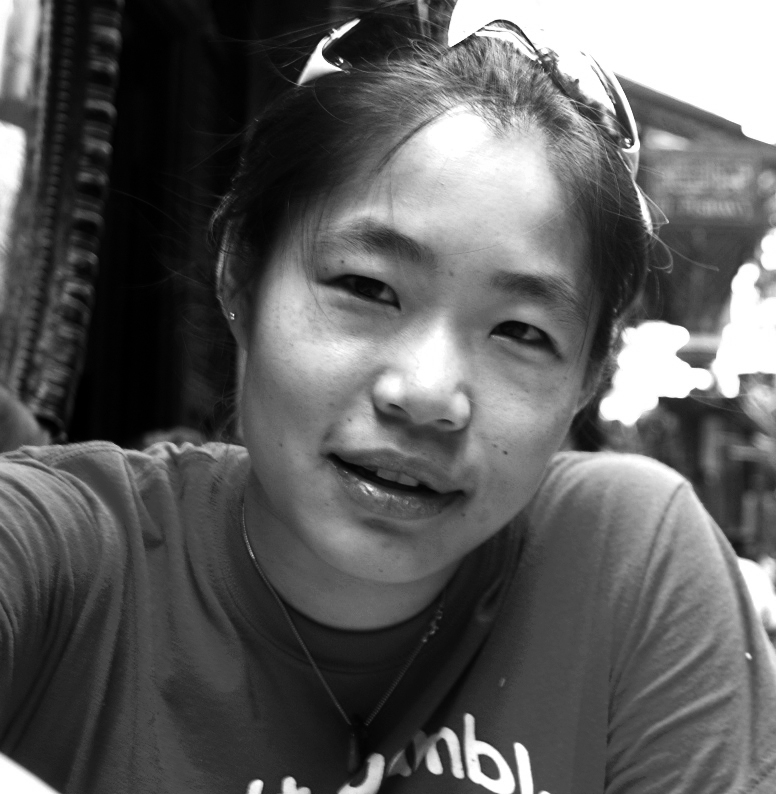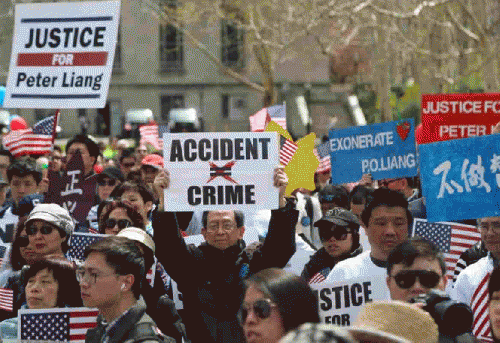The conviction of Peter Liang is the best thing that has happened to Asian Americans since the Immigration and Nationality Act of the 1960s. It's also an embarrassingly example of how bewildered the minds of some Asian Americans are when it comes to race.
The conviction is a much-needed wake-up call to those who have been brainwashed to believe the model-minority myth. It's clear evidence that white America still views Asian Americans as "other." The "blue wall of silence" does not cover yellow.
Peter Liang's conviction makes painfully obvious three crucial facts that are necessary to understand the racial circumstances of Asian Americans. (1) American racism includes Asian Americans. (2) Through intentional legislation and campaigning, the white majority has utilized the educational and financial privilege of a portion of Asian Americans to convince society that racism is no longer an issue. (3) Asian Americans themselves have fallen prey to this message, driving a wedge between the Asian American community and other communities of color and weakening our collective power to change the status quo.
The model-minority myth has led much of America to believe that through hard work and an unwavering dedication to academic achievement, Asian Americans have achieved the true American dream, supposedly showing that it is not systemic racism but lack of adherence to American work ethic that holds back other communities of color.
While the falsehoods that make up the model-minority stereotype and its toxic impacts are too complex and numerous to unpack in their entirety here, exploring a few the issues is necessary. A key misunderstanding is the origin of stereotypes. While most of us recognize that stereotypes are generalizations that cannot be applied to any one individual, we also believe that they spring from a small grain of truth. They represent a generalization of a true trend in behavior or characteristic that is common amongst a group of people.
What this line of reasoning fails to capture is that frequently these behavioral trends are not inherent, but a group of people all responding to a uniform external pressure. For example, the disproportionate number of black athletes in the NBA does not represent an inherent racial ability any more than the disproportionate number of white athletes in the NHL does. It's a reflection of the networks and opportunities available to black males in this country. Under the same social restrictions, many black men come to the same conclusion: the only way to make it is to become a professional athlete and the only sports available are basketball and football.
Similarly, Asian Americans don't have an inherent, racial propensity for laundry cleaning and grocery stores. It's a legacy from discrimination in this country. For example, in the 1800s there was a backlash against Asian Americans. Employers refused to hire them. Ronald Takaki's Strangers From a Different Shore documents a Chinese man describing that time period: "You couldn't work in the cigar factories or the jute or wollen mills any more -- all the Chinese had been driven out. About all they could be was laundrymen or vegetable peddlers."
While most Americans attribute the high representation of East and South Asians in graduate schools, engineer firms, computer science, and medicine to the work ethic of Asian cultures and perhaps some genetic propensity for mental calculation, in reality its much more a reflection of US immigration policy.
The removal of the quota system in the 1960s was a huge step in opening up the United States to immigrants from all over the world. The philosophy of that legislation still drives current day immigration policy. Foreigners are more welcome now, but only the ones that have desirable skills. That typically translates into immigrants with college or graduate degrees. The result is that the US selects disproportionately from the more educationally and financially privileged classes of foreign countries. This privilege is passed down to their children who use that advantage to achieve well academically. We know that one of the highest predictors of educational attainment is the level of parental educational attainment.
While this leads to an appearance of racial parity, the reality is that Asian Americans, even in these prestigious jobs, make less money and are given less leadership positions than their white counterparts. Furthermore, if you look at Asian American families that arrived without educational or financial advantages, their poverty rates are just as high, and sometimes higher than Black and Latino Americans.
The model minority does not represent not racial achievement. It represents class and educational privilege.
The model-minority concept is not an identity that Asian Americans created for themselves. It's a concept that has been imposed upon Asians by the white-majority class. It was first coined in a 1966 Newsweek article, "Success Story, Japanese-American Style." But in 1966, there were still miscegenation laws that made it illegal for Asian Americans to marry white Americans; clearly the majority still saw Asians as inferior people of color.
The dissemination of the model-minority concept was not a reflection of reality but rather a direct response to the civil-rights movements. It's not a coincidence that its genesis was at the height of the black civil-rights movement. It was a political maneuver to minimize racism against black Americans and imply that it was their own poor work ethic that lead to disparities. It also drove a wedge between communities of color, thus decreasing their unified voice and power.
Since the 1960s politicians like Ronald Reagan have loved to describe Asian Americans as exceptional. In a speech in 1981 he stated, "Overcoming great hardships, [Asian Americans] have lived the American dream, and continue as exemplars of hope and inspiration." The implications of this are profound. It implies that a meritocracy truly exists in this country. It implies that the "success of Asian Americans" proves that we are a post-racial society. It implies that all of the inequities that exist between white Americans and black Americans are not a result of racism, but a result of the failure of black Americans to work hard and improve their own lives.
This model-minority myth is so powerful that even Asian Americans have internalized it. I'm shocked at the number of Asian Americans that have told me that they don't think racism against Asian Americans is an issue in their workplace. What doesn't shock me is that they are usually young, born in the US with native English skills, East Asian (usually Chinese), and have at least a college degree. They are uniformly naà �ve. They are Asian Americans blinded by their own privilege.
(Note: You can view every article as one long page if you sign up as an Advocate Member, or higher).






